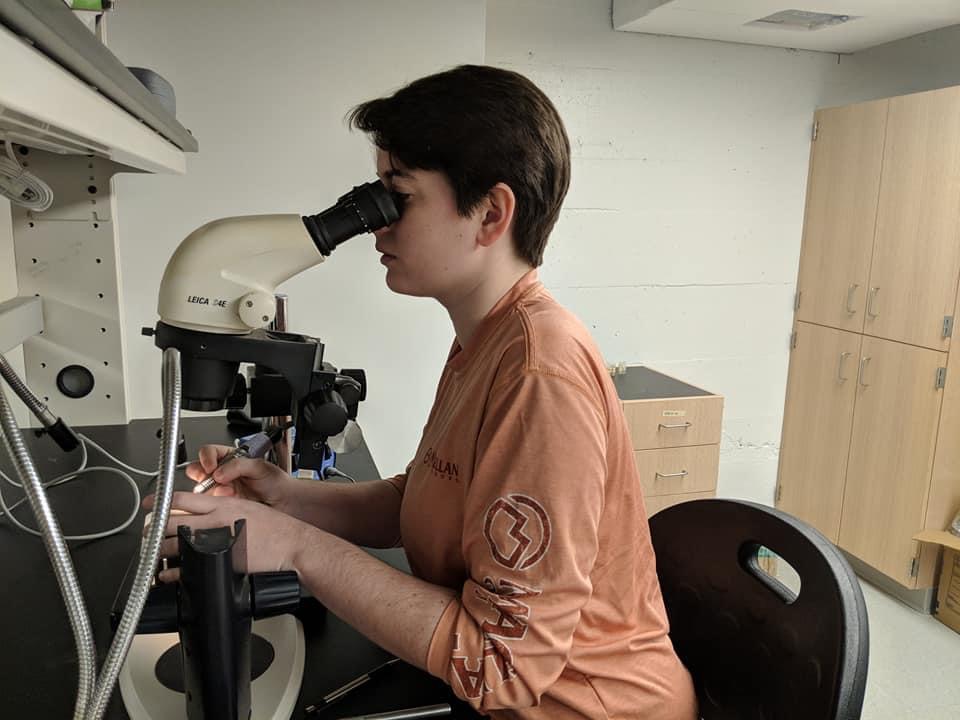Tennessee Tech alumna, professor publish research on ancient eastern African environmental landscape

Tech alumna Kayla Hillis studies samples collected from Africa.
A recent publication in the journal Science featuring Kayla Hillis, a Tennessee Tech University alumna, and Lauren Michel, Ph.D,
assistant professor of earth science at Tech, is reshaping what scientists think Africa
looked like millions of years ago.
The study reconstructed the environments that existed 20 million years ago in eastern
Africa, and how these environments influenced the development of early apes. Many
previous studies showed that during this time, equatorial Africa was covered by a
forest and that warm-climate grasses didn’t appear to any great extent until between
eight to 10 million years ago.
In 2013, a number of researchers who had been working independently at nine different
sites in Kenya and Uganda joined forces and started a large collaborative research
project: the Research on Eastern African Catarrhine and Hominoid Evolution project
(REACHE). This allowed for scientists with different specialties to move between sites
and for everyone to standardize the techniques they used to collect data.
One of those researchers was Michel, who had been working in Kenya as part of a larger
international group on one of the REACHE sites for many years. In 2017, Kayla Hillis,
who was then a student in the Department of Earth Sciences, expressed interest in
the research and a desire to be involved as part of her senior thesis. Michel gave
Hillis the task of analyzing the stable isotopic geochemistry of some of the samples
that she had brought back from the Wayando Formation on Mfangano Island.
“Kayla was an ideal student for this study,” Michel said. “She had done two other
research projects with other earth sciences faculty as part of their honors experience.
So, when she asked to work with me on her senior thesis, I knew she had the perfect
experiences and preparation to be able to work on this project.”
As Hillis collected her senior thesis data, she found what other researchers working
on the project were also discovering in their own labs. There was evidence at a number
of different sites in eastern Africa of both open habitats and locally abundant C4
grass, 10 million years earlier than previously documented. This discovery meant that
C4 grasses and open habits were important parts of the early Miocene landscape. It
also means that early apes were able to exist in a diversity of environments including
closed-canopy forests and more open habitats.
“It was a great experience on multiple levels,” said Hillis, who came from Rock Island,
Tennessee, and graduated from Tech with her degree in geosciences. “I was able to
challenge myself academically, experience working in other labs and travel to a conference
that was centered around anthropology. I was able to see how geology can fit in with
other disciplines and work side-by-side to explain the mysteries of the Earth prior
to written record.”
Michel said, “It’s a highlight of many scientists’ careers to get a paper published
in Science. Kayla is the only undergraduate student listed as a coauthor on that paper,
that I know of. She was a strong student who made the most of her Tech experience
and prepared herself for great opportunities.”
Now Hillis is a project professional for the environmental consulting firm GEI Consultants
Inc. in New York, which oversees environmental remediation, performs sampling on air,
water and soil, and conducts other environmental assessments.
“Dr. Michel is a fantastic research advisor,” Hillis said. “She takes time to teach
and explain hard subjects while simultaneously pushing you to do your best. I appreciate
the experiences she gave me by letting me be a part of this research project.”
As a professor, one of the things that excites Michel the most is that she is able
to offer these types of experiences to her undergraduate students. She recalls when
she was an undergraduate herself, it was extremely difficult to get access to be able
to work on such groundbreaking projects.
“Tennessee Tech students are capable of doing incredible research – really cutting-edge
research – and finding really great things that will benefit the general public or
the larger scientific community,” Michel said.

